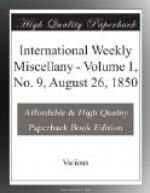had struck him as strange. He began to suspect,
I repeat, and the effect that this suspicion had on
him, it would be impossible to describe to you.
Even now, after so long a time, now that I am accustomed
to his ways, and more reconciled to my fate by the
side of a noble, though somewhat impetuous man, it
makes me tremble to think of those paroxysms, which
the idea that I did not love him called forth.
They were fearful; he nearly sank under them.
During two days his life was in danger. At last
the storm passed, my father died; Jules watched over
me with the tenderness of a brother, the solicitude
of a parent; for that indeed I shall ever be grateful.
His suspicion once awakened, he gazed round with penetrating
looks to discover the cause of my altered feelings.
But your friend never came to our house; we met in
an unfrequented spot, and my father’s illness
had interrupted these interviews. Altogether I
cannot tell if Jules discovered anything. A fearful
circumstance rendered all our precautions useless,
and cut the knot of our secret connection, to loose
which voluntarily I felt I had no power. A wedding
feast, at a neighboring castle, assembled all the
nobility and gentry, and officers quartered near,
together; my deep mourning was an excuse for my absence.
Jules, though he usually was happiest by my side, could
not resist the invitation, and your friend resolved
to go, although he was unwell; he feared to raise
suspicion by remaining away, when I was left at home.
With great difficulty he contrived the first day to
make one at a splendid hunt, the second day he could
not leave his bed. A physician, who was in the
house, pronounced his complaint to be violent fever,
and Jules, whose room joined that of the sick man,
offered him every little service and kindness which
compassion and good feeling prompted; and I cannot
but praise him all the more for it, as who can tell,
perhaps, his suspicion might have taken the right
direction? On the morning of the second day—but
let me glance quickly at that terrible time, the memory
of which can never pass from my mind—a
fit of apoplexy most unexpectedly, but gently, ended
the noblest life, and separated us forever! Now
you know all. I inclose the ring. I cannot
write more. Farewell!”
The conclusion of the letter made a deep impression
on Edward. His dream rose up before his remembrance,
the slight indisposition, the sudden death, the fearful
nursetender, all arranged themselves in order before
his mind, and an awful whole rose out of all these
reflections, a terrible suspicion which he tried to
throw off. But he could not do so, and when he
met the captain and D’Effernay in the evening,
and the latter challenged his visitors to a game of
billiards, Edward glanced from time to time at his
host in a scrutinizing manner, and could not but feel
that the restless discontent which was visible in
his countenance, and the unsteady glare of his eyes,
which shunned the fixed look of others, only fitted




